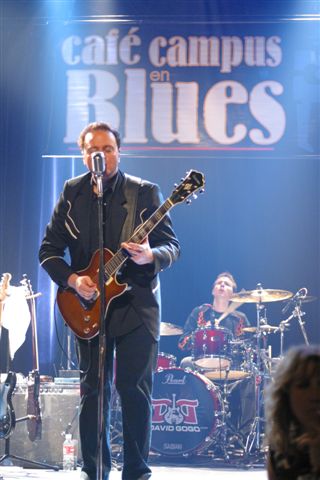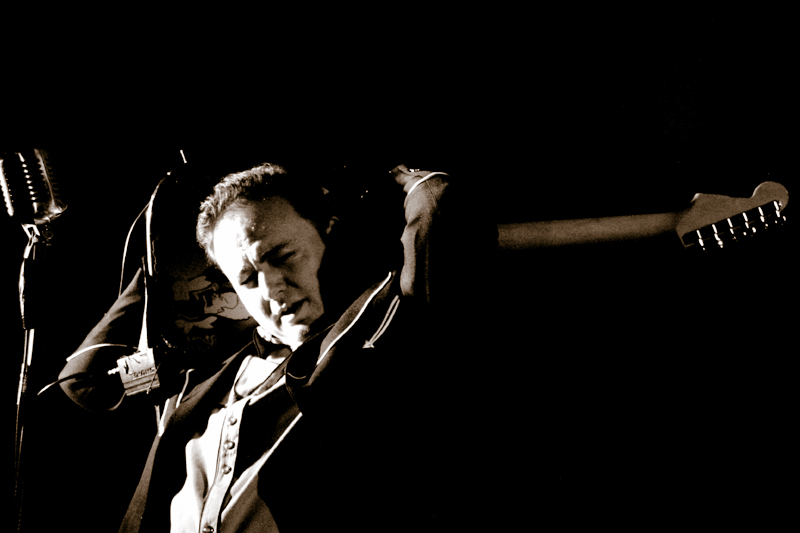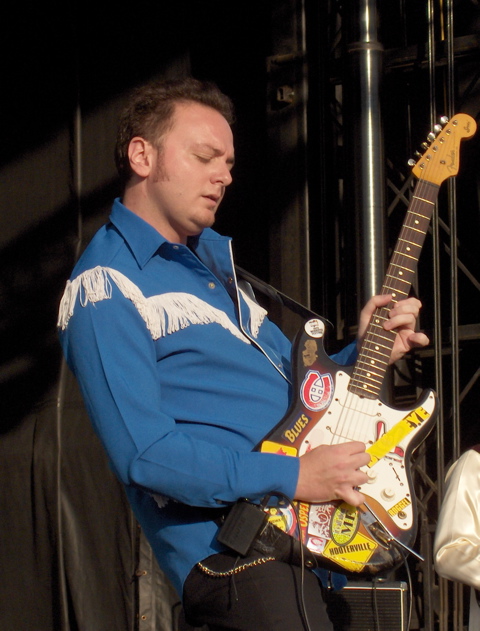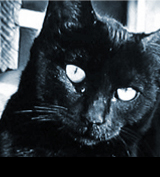|
Blues Revue called him a “fiery
guitarist”, a “world-class slide player” and as “soulful a singer as he is guitarist.” CanadianBlues.ca
says he “dazzles us with his guitar brilliance.” He is "very entertaining" says the The Journal of the Classic
Rock Society (UK) and is "truly one of Canada's most unique and exceptional talents” declares the Canadian Music Network
and he’s “a commanding singer and crack guitarist" says Exclaim!
With a string of acclaimed albums
and awards, Mr. Gogo has earned every word of this praise. Let’s get to know him a little better...
CB: Hi David. You began working as a professional musician
by the age of 16. Were your first musical working experiences in the blues genre?
DG: I started my own band
and we included songs by 60's rock bands like the Stones and the Kinks in our set but there was a heavy blues influence as
well. The early T-Birds, the Paladins and Magic Sam were a big part of what we were into. I think that I'm part of the last
generation of players that (barely) started playing blues before being aware of Stevie Ray Vaughan. But once I saw what he
could do...
CB: So who were your main blues influences?
DG: My earliest blues influence
came through my Dad's records; B.B., Hank Williams, Otis Redding, Canned Heat, Taj Mahal. Later I got into Magic Sam, Otis
Rush, Buddy Guy, Lonnie Mack, Johnny Winter, ALBERT COLLINS!!!! , Son House, Bukka White .... Can I stop now ?!?
CB: One more…You mentioned Stevie Ray Vaughan and Double Trouble, who truly revitalized the
blues in the 1980s. What impact did SRV have on you?
DG: Stevie was the savoir
of the blues. He not only got the old masters back into the spotlight, but gave guys like me a chance to do what I do for
a living. I opened some shows for Double Trouble a while back and reintroduced myself to them, showed them my old photo of
me with Stevie and Chris and thanked them for all they did. His influence has been paramount to keeping the blues alive.

|
| David on stage at Café Campus in Montreal. Photo by Anick Vaillancourt. |
CB: How did signing with EMI/Capitol Music impact on your career?
Why did you eventually part ways with EMI?
DG: It seemed like the right
thing to do at the time. I was young and kinda just let things happen. Rick Parasher is a great producer, the players were
top notch but EMI seemed to have a different agenda than we did. At one point I thought that I was going nuts!! Eventually
I found out that the head of A&R in charge of the project had to take a leave of absence to deal with his mental health.
Hmmmm..... Go figure... I've had some not so great luck with my career at times!!
CB: On a positive aspect of your career, your 1994 self-titled debut album received a Juno nomination
for Best New Artist. Did that Juno nomination help boost your visibility?
DG: Yeah, sure. All those
accolades help, unfortunately, the writing was on the wall that I was going to be unceremoniously dumped by the label immediately
following the awards!!
CB: How does your follow up "Dine Under the Stars" CD compare to your debut release?
DG: It was an off the cuff
move that happened to work! It’s probably a lot closer to what my debut should have been. The band was just barely rehearsed
enough to know the song structures but under rehearsed enough to have an "on the edge" energy going on. Once again, amazing
musicians. Always surround yourself with the best! " Dine " really caught on in Holland and Belgium and France. It's fun.
CB: At this point in your career you signed with Canadian Independent Cordova Bay Records. What role has signing with Cordova Bay Records had for you and your career?
DG: It's the best thing
I've ever done.
CB: What led to you taking a more rock-oriented approach on your Cordova Bay release "Change of
Pace"?
DG: I thought we had some
good songs and figured "what the hell?". We had a top 30 hit in Canada with "Sad and Lonely". Listening to it now I realize
that there are some serious mastering / production problems and some of the performances could have been better. Oh, well.
Live and learn!
CB: Tell us about your fourth Cordova Bay release "Halfway to Memphis".
DG: It was only going to
be released in Europe at first, but it came out in Canada as well and helped establish me as a blues artist on a national
level. All of a sudden I began to be nominated for Maple Blues Awards, stared getting offers for festivals, etc. It was a
good step in direction towards "Skeleton Key".

|
| Behind the back! Photo by Steve Rogers. |
CB: Your latest release “VIBE” includes appearances from Tom Wilson and Jeff Healey. How did those collaborations come about?
DG: They're both guys I've
kinda known, but not really over the years. I got reacquainted with Tom through his involvement with Blackie and the Rodeo
Kings and was interested in writing with him. A really nice, funny guy who I get along with. I got to know Jeff from playing
at his club in Toronto. What can you say about his playing? He really nailed it on "She's Alright".
CB: Among your many award recognitions are “Guitarist of the Year” at the 2003 Maple
Blues Awards, 2004 CBC Saturday Night Blues, "Great Canadian Blues Award", and 2005 Maple Blues Awards “Guitarist of
the Year”. Interestingly, you received a 2004 Juno nomination for your Live at Deer Lake album, and then the nomination
was revoked. What happened? Where
did the mistake occur?
DG: It was a silly technical
error that should have been recognized by the Juno committee before they got us all excited. They wouldn't give us a break,
so we took a positive approach to it and that got us more attention in the press and music circles than any award would have
got. Silliness!
CB: You’ve had several European tours and American blues festival appearances. Which festivals are highlights for you?
DG: They're all highlights.
I just love playing in front of a great audience. Opening shows for people like Johnny Winter, Thorogood, B.B. and the like
over the last few years doesn't hurt either!!
CB: You have toured and played with many notable blues acts.
Which ones stand out for you?
DG: I really miss Albert
Collins. There will never be another like him. I’m gonna have breakfast now!
Well, the founders of Crossroads Blues know the importance of not missing breakfast (or ANY meals
for that matter), so we’ll end it here by thanking David for his time in answering our questions. Check out his site
at www.davidgogo.org.

|
| David at the 2004 Ottawa Bluesfest |
|

